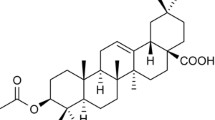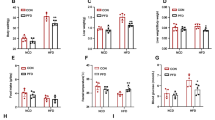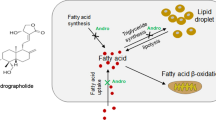Abstract
Non-alcoholic fatty liver disease (NAFLD) is the most common liver disease. The mechanism by which medium- and long-chain triglyceride (MCT/LCT) propofol plays a role in promoting NAFLD remains unclear. In this study, we investigated the effect of MCT/LCT propofol on NAFLD progression and its mechanism of action. In Huh-7 and HepG3 cells induced by free fatty acids (FFA), propofol downregulated the expression levels of TG and lipid metabolism-related proteins by promoting the activation of the PI3K/AKT pathway and suppressing FFA-induced lipid metabolic disorders. In a high-fat diet (HFD) -induced NAFLD mouse model, we demonstrated that propofol significantly inhibited liver steatosis, inflammatory cell infiltration, and fibrosis. In conclusion, our results suggest that MCT/LCT propofol reduces liver lipid accumulation by activating the PI3K/AKT pathway and further suppressing the NAFLD process.





Similar content being viewed by others
Data Availability
The datasets used and/or analyzed during the current study are available from the corresponding author upon reasonable request.
References
Alves-Bezerra M, Cohen DE (2017) Triglyceride metabolism in the liver. Compr Physiol 8:1–8. https://doi.org/10.1002/cphy.c170012
Chen Z, Chen L, Sun B et al (2021) LDLR inhibition promotes hepatocellular carcinoma proliferation and Metastasis by elevating intracellular cholesterol synthesis through the MEK/ERK signaling pathway. Mol Metabolism (Germany) 51:101230. https://doi.org/10.1016/j.molmet.2021.101230
Deprince A, Haas JT, Staels B (2020) Dysregulated lipid metabolism links NAFLD to Cardiovascular Disease. Mol Metab 42:101092. https://doi.org/10.1016/j.molmet.2020.101092
Dostert C, Grusdat M, Letellier E et al (2019) The TNF family of ligands and receptors: communication modules in the Immune System and Beyond. Physiol Rev 99:115–160. https://doi.org/10.1152/physrev.00045.2017
Fan Y, He Z, Wang W et al (2018) Tangganjian decoction ameliorates type 2 Diabetes Mellitus and nonalcoholic fatty Liver Disease in rats by activating the IRS/PI3K/AKT signaling pathway. Biomed Pharmacother 106:733–737. https://doi.org/10.1016/j.biopha.2018.06.089
Feng X, Yu W, Li X et al (2017) Apigenin, a modulator of PPARgamma, attenuates HFD-induced NAFLD by regulating hepatocyte lipid metabolism and oxidative stress via Nrf2 activation. Biochem Pharmacol 136:136–149. https://doi.org/10.1016/j.bcp.2017.04.014
Friedman SL, Neuschwander-Tetri BA, Rinella M et al (2018) Mechanisms of NAFLD development and therapeutic strategies. Nat Med 24:908–922. https://doi.org/10.1038/s41591-018-0104-9
Gao H, Zhong Y, Zhou L et al (2023) Kindlin-2 inhibits TNF/NF-kappaB-caspase 8 pathway in hepatocytes to maintain liver development and function. Elife 12. https://doi.org/10.7554/eLife.81792
He T, Zhao Y, Zhao P et al (2022) Signaling pathway(s) of TNFR2 required for the immunoregulatory effect of CD4(+)Foxp3(+) regulatory T cells. Int Immunopharmacol 108:108823. https://doi.org/10.1016/j.intimp.2022.108823
Li M, Ye J, Zhao G et al (2019) Gas6 attenuates lipopolysaccharideinduced TNFalpha expression and apoptosis in H9C2 cells through NFkappaB and MAPK inhibition via the Axl/PI3K/Akt pathway. Int J Mol Med 44:982–994. https://doi.org/10.3892/ijmm.2019.4275
Li J, Wang T, Liu P et al (2021) Hesperetin ameliorates hepatic oxidative stress and inflammation via the PI3K/AKT-Nrf2-ARE pathway in oleic acid-induced HepG2 cells and a rat model of high-fat diet-induced NAFLD. Food Funct 12:3898–3918. https://doi.org/10.1039/d0fo02736g
Liang J, Liu Y, Liu J et al (2018) Chitosan-functionalized lipid-polymer hybrid nanoparticles for oral delivery of silymarin and enhanced lipid-lowering effect in NAFLD. J Nanobiotechnol 16:64. https://doi.org/10.1186/s12951-018-0391-9
Lien EC, Dibble CC, Toker A (2017) PI3K signaling in cancer: beyond AKT. Curr Opin Cell Biol 45:62–71. https://doi.org/10.1016/j.ceb.2017.02.007
Powell EE, Wong VW, Rinella M (2021) Non-alcoholic fatty Liver Disease. Lancet 397:2212–2224. https://doi.org/10.1016/S0140-6736(20)32511-3
Singla B, Malde AD (2018) A prospective observational study of injection pain in children with medium plus long chain triglyceride and long chain triglyceride propofol premixed with lignocaine. Indian J Anaesth 62:214–218. https://doi.org/10.4103/ija.IJA_506_17
Tan X, Cao Z, Li M et al (2016) TNF-alpha downregulates CIDEC via MEK/ERK pathway in human adipocytes. Obes (Silver Spring) 24:1070–1080. https://doi.org/10.1002/oby.21436
Walsh CT (2018) Propofol: milk of Amnesia. Cell 175:10–13. https://doi.org/10.1016/j.cell.2018.08.031
Wang LY, Wu J, Gao YF et al (2020a) Medium- and long-chain triglyceride propofol reduces the activity of acetyl-coenzyme A carboxylase in hepatic lipid metabolism in HepG2 and Huh7 cells. Korean J Physiol Pharmacol 24:19–26. https://doi.org/10.4196/kjpp.2020.24.1.19
White MF (1997) The insulin signalling system and the IRS proteins. Diabetologia 40 Suppl 2S2–S17. https://doi.org/10.1007/s001250051387
Wisessaowapak C, Watcharasit P, Satayavivad J (2021) Arsenic disrupts neuronal insulin signaling through increasing free PI3K-p85 and decreasing PI3K activity. Toxicol Lett 349:40–50. https://doi.org/10.1016/j.toxlet.2021.06.002
Wittka A, Ketteler J, Borgards L et al (2022) Stromal fibroblasts counteract the Caveolin-1-Dependent Radiation response of LNCaP prostate carcinoma cells. Front Oncol 12:802482. https://doi.org/10.3389/fonc.2022.802482
Wu HM, Ni XX, Xu QY et al (2020) Regulation of lipid-induced macrophage polarization through modulating PPAR‐γ activity affects hepatic lipid metabolism via TLR4/NF‐κB signaling pathway. J Gastroenterol Hepatol. https://doi.org/10.1111/jgh.15025
Wu SC, Lo YM, Lee JH et al (2022) Stomatin modulates adipogenesis through the ERK pathway and regulates fatty acid uptake and lipid droplet growth. Nat Commun 13:4174. https://doi.org/10.1038/s41467-022-31825-z
Yang J, Fernandez-Galilea M, Martinez-Fernandez L et al (2019) Oxidative stress and non-alcoholic fatty Liver Disease: effects of Omega-3 fatty acid supplementation. Nutrients 11. https://doi.org/10.3390/nu11040872
Yew WS, Chong SY, Tan KH et al (2005) The effects of Intravenous Lidocaine on Pain during injection of medium- and long-chain triglyceride propofol emulsions. Anesth Analg 100:1693–1695. https://doi.org/10.1213/01.ANE.0000151718.58709.0B
Zhang Z, Tian L, Jiang K (2019) Propofol attenuates inflammatory response and apoptosis to protect d-galactosamine/lipopolysaccharide induced acute liver injury via regulating TLR4/NF-κB/NLRP3 pathway. Int Immunopharmacol 77:105974. https://doi.org/10.1016/j.intimp.2019.105974
Zhang N, Wang Y, Zhang J et al (2020) N-glycosylation of CREBH improves lipid metabolism and attenuates lipotoxicity in NAFLD by modulating PPARα and SCD‐1. FASEB J 34:15338–15363. https://doi.org/10.1096/fj.202000836RR
Zhao XJ, Yu HW, Yang YZ et al (2018) Polydatin prevents fructose-induced liver inflammation and lipid deposition through increasing miR-200a to regulate Keap1/Nrf2 pathway. Redox Biol 18:124–137. https://doi.org/10.1016/j.redox.2018.07.002
Zhou J, Zhou F, Wang W et al (2020) Epidemiological features of NAFLD from 1999 to 2018 in China. Hepatology 71:1851–1864. https://doi.org/10.1002/hep.31150
Acknowledgements
Not applicable.
Funding
Not applicable.
Author information
Authors and Affiliations
Contributions
M H and W L conceived the study; H C and Y S conducted the experiments; C H and L W analyzed the data; and H L was a major contributor in writing the manuscript. All authors have read and approved the final manuscript.
Corresponding author
Ethics declarations
Ethics approval and consent to participate
All the animal experiments were complied with the guidelines of the Tianjin Medical Experimental Animal Care, and animal protocols were approved by the Institutional Animal Care and Use Committee of Yi Shengyuan Gene Technology (Tianjin) Co., Ltd. (protocol number YSY-DWLL-2022224). All methods were carried out in accordance with relevant guidelines and regulations. All methods were performed in accordance with the ARRIVE guidelines for reporting animal experiments.
Consent for publication
Not applicable.
Competing interests
The authors declare no competing interests.
Additional information
Publisher’s Note
Springer Nature remains neutral with regard to jurisdictional claims in published maps and institutional affiliations.
Rights and permissions
Springer Nature or its licensor (e.g. a society or other partner) holds exclusive rights to this article under a publishing agreement with the author(s) or other rightsholder(s); author self-archiving of the accepted manuscript version of this article is solely governed by the terms of such publishing agreement and applicable law.
About this article
Cite this article
Liu, H., Hao, M., Liu, W. et al. Medium- and long-chain triglyceride propofol activates PI3K/AKT pathway and inhibits non-alcoholic fatty liver disease by inhibiting lipid accumulation. J Bioenerg Biomembr 56, 45–53 (2024). https://doi.org/10.1007/s10863-023-09997-0
Received:
Accepted:
Published:
Issue Date:
DOI: https://doi.org/10.1007/s10863-023-09997-0




